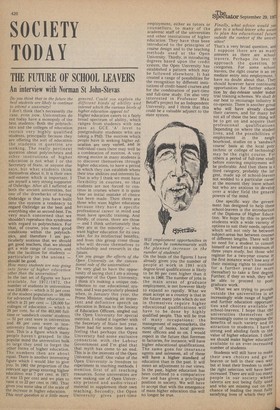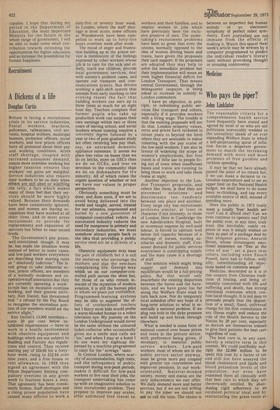THE FUTURE OF SCHOOL LEAVERS
An interview with Norman St John-Stevas
Do you think that in the future the best students are likely to continue to attend a university?
I don't think that's necessarily the case, even now. Universities do not today have a monopoly of the best students. Both the polytechnics and the colleges of education, recruit very highly qualified students, principally because they are offering the sort of education the students in question are seeking. The really pertinent question about polytechnics and other institutions of higher education is not what I or the Secretary of State, or anyone else says, but what students think themselves about it. It is their own self-esteem which is important. I am myself a very strong supporter of Oxbridge. After all I suffered at both the ancient universities, but one of the drawbacks of having Oxbridge is that you have built into the system a tendency to regard Oxbridge as the best and everything else as second-best. I'm very much concerned that we shouldn't reproduce this syndrome with regard to polytechnics. For that, of course, you need good conditions within the polytech nics, and therefore I am particularly anxious that we should get good teachers, that we should get a wide range of courses, and that the facilities for students — particularly in the unions — should be good.
How many students are now going into forms of higher education other than the universities?
In the last set of figures we have available, for 1971/1972, the number of students in universities was 236,000 — which is 51 per cent of the student population — 99,000 for advanced further education — which is 21 per cent — 128,000 for colleges of education — which is 28 per cent. So of the 463,000 full time or 'sandwich course' students — 51 per cent were in universities and 49 per cent were in non university forms of higher education. This is a figure which many people haven't grasped. In the popular mind the universities bulk so large they tend to forget the other forms of higher education. The numbers then are about equal. There is another interesting figure which I would like to give you. In 1961 the proportion of the relevant age group entering higher education was 7 per cent, in 1971 it was 15 per cent and we plan to raise it to 22 per cent in 1981. That gives you some idea of the scale of the increase in higher education. This next question is a little more
general. Could you explain the different kinds of ability, and interest which the various levels of higher education appeal to? Higher education caters to a fairly broad spectrum of ability, which ranges from students with one pass at GCE 'A' level to postgraduate students who are taking a PhD. The motives which people have in seeking higher education are very varied, and in individual cases there may well be a combination of motives. A very strong motive in many students is to discover themselves through higher education, to have a period in which they can establish where their true abilities and interests lie. That is why I think we must have flexibility in courses, so that students are not forced to continue in courses where it is quite clear an initial mistake of choice has been made. Then there are those who want higher education because they have a specific
professional career in mind and must have specific training. And thirdly, of course, there are those — and I think unfortunately that they are in the minority — who want higher education for its own sake, for its intellectual benefits, and from this group come those who will devote themselves to scholarship and research in the future.
Can you gauge the effects of the Open University on the conventional role of the universities?
I'm very glad to have the opportunity of saying that I am a strong supporter of the Open University. I think it's making a unique contribution to our educational system, and I was particularly pleased when, in January this year, the Prime Minister, making an important and definitive speech on education in Britain to the Society. of Education Officers, singled out the Open University for special mention. I visited it together with the Secretary of State last year. There had for some time been a feeling that perhaps the Open University had some exclusive connection with the Labour Government and I'm glad that that myth has come to an end. This is in the interests of the Open University itself. One value of the Open University is freedom to experiment in teaching methods. I mention first of all teaching resources. Some universities are now making use of Open University printed and audio-visual material to supplement their own teaching. Secondly, the Open University gives part-time
employment, either as tutors or counsellors, to many of the academic staff of the universities and other institutions of higher education. They have thus been introduced to the principles of course design and to the teaching methods used at the Open University. Thirdly, in introducing degrees based upon the credit system, the Open University has established a pattern which may be followed elsewhere. It has created a range of possibilities for the recognition by different institutions of credit-based courses and for the combination of part-time and full-time study. I'm also very interested in Professor Max Beloff's project for an Independent University, and I think that this could be a valuable adjunct to the state system.
Will employment opportunities in the future be commensurate with the planned increase in the number of students?
On the basis of the figures I have already given you the number of people at work in 1981 with degree-level qualifications is likely to be 80 per cent higher than it was in 1966. The number of jobs in the main areas of graduate employment, is not however likely to expand so rapidly. What we must accept as a country is that in the future many jobs which do not in themselves require higher educational qualifications will have to be done by highly qualified people. This will be true of many occupations: the management of supermarkets, the running of banks, local government officers and so on. I would expect in the future that foremen in factories, for instance, will have higher educational qualifications. The same goes for insurance agents and salesmen, all of these will have a higher standard of education than in the past. It will mean an adjustment to our views. In the past, higher education has been confined to a comparative few and has given a privileged position in society. We will have to accept that with the emergence of mass higher education this will no longer be true. zpectator September 29, 1971
Finally, what advice would yoll give to a school-leaver who wants to plan his educational future outside the context of the univer sities?
That's a very broad question, and I suppose there are as man!' answers as there are school. leavers. Perhaps its best to approach the question by categories. For some school' leavers, the right course is an immediate entry into employment. I have no doubt about that. They should however have continuing opportunities for further educs• tion by day-release under industrial training schemes. We shall do our best to encourage industry to co-operate. There is another grouP who will have already chosen their careers, and for many but not all of these the best thing will be to get on and acquire their' professional qualifications Depending on where the studeM lives, and the possibilities et employment in the neighbourhood, studies on a 'sandwichl course' basis at the local polytechnic or college of technology may be the right course. For others a period of full-time study before entering employment will be preferable. And then there is a third category, probably the lar.. gest, made up of school-leavers not wedded to a particular career at the moment they leave school, but who are anxious to develop over a wider field the general powers of the mind.
One specific way the government has designed to help these school-leavers is the introduction of the Diploma of Higher Education. We hope by this to provide students with a wide variety of optiOns to suit their needs, options which will not only be between subject-areas but between courses of different lengths. There will be no need for a student to commit himself or herself to a minimum of three years study, but those who register for a two-year course ill the first instance won't lose any of their existing rights to continue for a further year (or more thereafter) to take a first degree. Further, if they so wish, they will be able to proceed to postgraduate work. What we are trying to provide I outside the universities is an ' increasingly wide range of higher and further education opportunities and choices available to school-leavers. I hope that the universities themselves will . increasingly come to recognise the benefits of such variety and itS attraction to students. I have 3 strong and abiding faith in the value of higher education. I think we should make higher education available to an ever-increasing number of students.
Students will still have to make their own choices and go to heaven or hell in their own waY but at least their freedom to make the right selection will have been increased. There are still too manY people in our society whose talents are not being fully used and who are missing out on the chance of leading the most fully satisfying lives of which they are
capable. 1 hope that during my period in the Department of Education, the most important/ Ministry for the future in the whole range of government, I will be able to make some small contribution towards extending the opportunities for higher education and so increase the possibilities for human happiness.











































 Previous page
Previous page